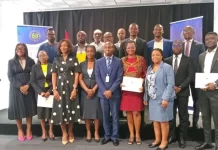
…As soldiers hijack lands
By Frederick ASIAMAH
What initially appeared to be an attempt by soldiers to pitch their camp in a community in the Brong Ahafo Region has reportedly turned into a battle for 345 acres of land. The rivals are four soldiers and one chief on the one side, and a community of 800 people on the other side.
The stretch of land is fertile for the cultivation of cashew, which is widely cultivated for its nuts and derived products in the West, East and Southern Africa as well as South Asia.
Currently, one 100kg bag of cashew sells for GHC600 and Business Day has learnt a farmer can harvest between 10 and 15 100kg bags of the cash crop per acre. Typically an acre can accommodate 40 cashew trees.
Assuming each of the 345 acres of cashew plantations in dispute yields 10 bags per season, the potential revenue that could be lost to the local farmers is GHC2,070,000.
Until last week, groves of cashew trees provided shade and fruit to the fields of Nwoase village in the Nkoranza South Municipality of Brong Ahafo Region. Then the village’s chief sold the land to a group of soldiers, who have indicated their intent to begin destroying the trees that form the people’s lifeline and hope for the future.
Now, Nwoase’s families will find themselves homeless, penniless, and with no means of support by year’s end, evicted from the lands they’ve farmed for decades to make room for the new owners’ cashew plantations.
Typically in Ghana, harvesting of cashew takes place between February and April. The cashew-nut tree blossoms between November and January and the fruit ripens fully within two months.
This is why alarm bells have been sounded in a statement issued on October 2, 2017 by Advocates for Community Alternatives (ACA), a non-profit that works with communities on legal empowerment and economic development.
No compensation
Business Day is informed that the courts would soon be asked by ACA to adjudicate on whether it is justifiable for a whole village of approximately 800 people to lose their farmlands to four individuals without compensation.
The aggregate land size lost out by these farmers is 345 acres, according to ACA.
Vulnerable
Located in the Salamkrom electoral area at Donkro Nkwanta, Nwoase has been hit hard by recent crises, said ACA.
“First, many villagers lost their savings in the DKM Diamond microfinance scandal. Then, successive years of poor rains brought poor harvests. This year, though the rains have returned, the melon rot and fall armyworm have devastated the melons and maize crops on which the community traditionally rely.
“So the people of Nwoase – like so many other communities in central Ghana – turned to cashew as a long-term investment.”
ACA reports that Peter K. Sanguru, Nwoase’s assemblyman has said: ‘Our seasonal crops have failed us, but we can make a living from cashew.’ He reportedly added: ‘We have been planting these trees for years, and we were expecting them to support our children.’
But Nwoase’s suitability for cashew growing proved to be both a blessing and a curse. In recent weeks, a group of soldiers attracted by the village’s fertile land managed to buy the residents’ fields out from under them.
Nwoase is said to be especially vulnerable because most of the people are descendants of migrants from the North who arrived decades ago.
These families supposedly rented the land according to a customary arrangement with Nana Adu Kofi III, Atekoanohene, and owner of most of the farmland in the village.
Sanguru explains, ‘For most of us, this is the only place we’ve ever known. We’ve lived here for generations, but we never thought we had any rights because we were settlers.’
Because most residents lacked land ownership rights recognized in either the formal or customary system, it was easy for the Atekoanohene to sell Nwoase’s 345 acres of farmland to the highest bidder.
This is not his first attempt to evict his people; last year, the Atekoanohene sold the land to a different purchaser but rescinded the sale for unknown reasons. The supposed new landowners had purportedly planned cutting down cashew trees on some 145 acres of land before the weekend, from both the land of tenant farmers and the fields of indigenous villagers who owned their land.
‘When we first saw them, they lied to us and said they were building a military camp,’ said Sanguru. ‘Then they cut our trees and told us we must never plant again on our land.’
Yet, according to Ghana’s laws, even tenant farmers have rights to the crops they cultivate and cannot be evicted or deprived of their harvest without compensation.
“Unfortunately, this tragedy is not unique,” said Jonathan Kaufman, Executive Director of ACA. “Here in Ghana and across the West African sub-region, governments and traditional chiefs are selling farmland that villagers rely on to investors who just want to turn a profit.”
Consequently, ACA has vowed to help the people of Nwoase protect their land and reassert their ability to choose a sustainable future for their children. “We are exploring legal and other avenues to ensure that the rights of the people of Nwoase are protected, explained Kaufman.


























